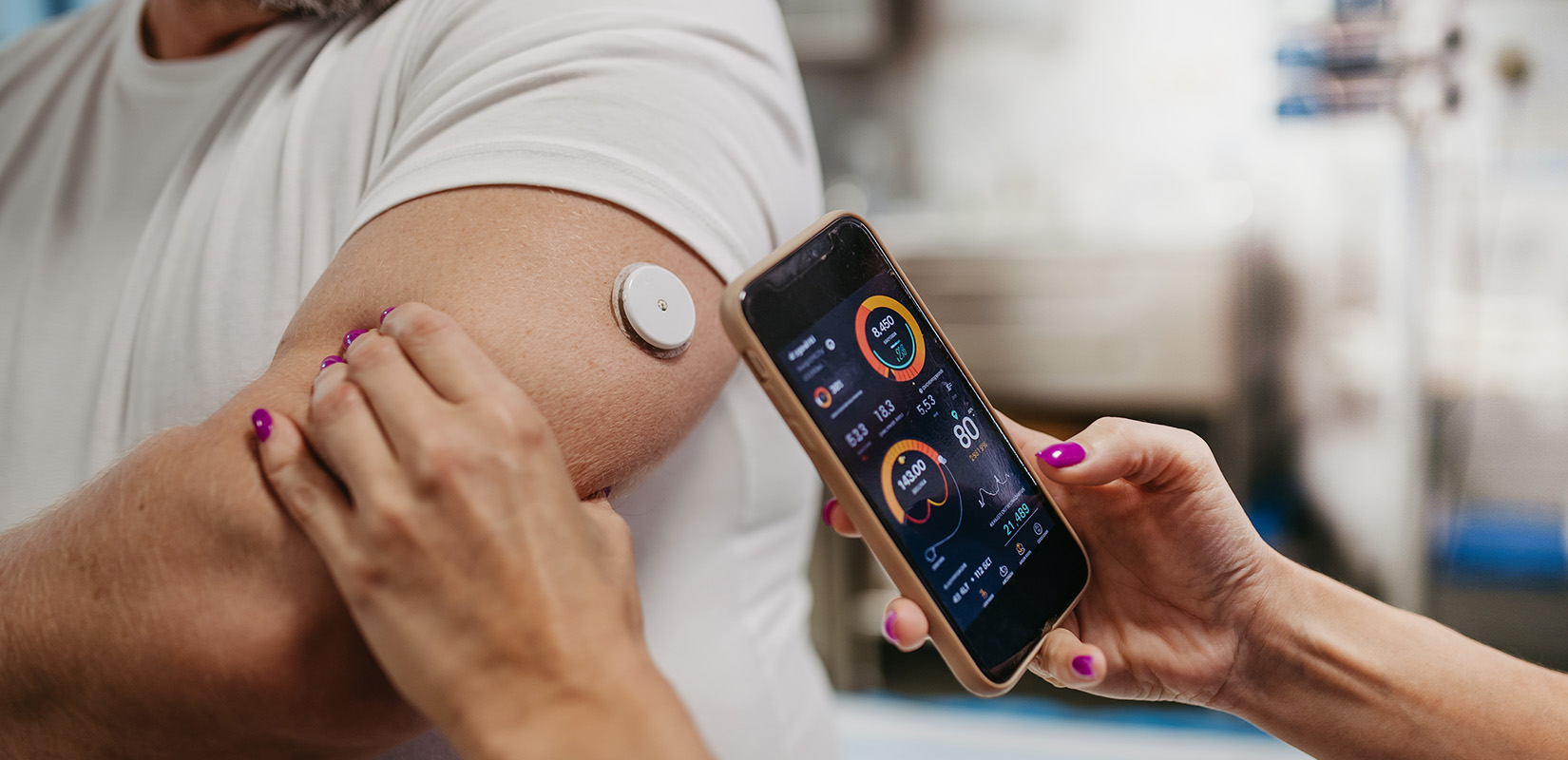
Diabetes Management
Almost 39 million Americans have diabetes – nearly 12 percent of the population. In addition, almost 4 out of 10 adults have prediabetes.
The good news is that diabetes can be prevented, managed and, in some cases, brought into remission. Our diabetes educators help patients manage diabetes through education and support.
Diabetes Education and Support
Our self-management program helps patients gain confidence in managing their health. Monthly classes include an individual assessment, a review of the diabetes disease process, nutritional education, physical activity consultations, medication support, disease monitoring, problem-solving, reducing risks, and suggesting healthy coping skills. Courses offered in the Self-Management Program include:
- Advanced Insulin Management: Teaches you to safely make changes in insulin doses, using protocols established by our endocrinologists. You will work closely with diabetes educators to improve your diabetes control.
- Gestational Diabetes Management Education: Provides education to maintain blood glucose control during pregnancy. Most women with well-controlled blood sugar deliver healthy babies without any complications.
- Insulin Injections: How to use insulin tools, such as insulin pens.
- Insulin Pump Management: Teaches skills necessary for insulin pump use, technical training on the pump, outpatient pump starts, recommended dosage rates, and making minor changes in insulin doses.
- Medical Nutrition Therapy: Involves a consultation with a Registered Dietitian; topics may include carbohydrate counting, understanding nutrition labels, meal planning, nutritional management of weight, lipids, high blood pressure, and celiac disease.
- Pre-conception and Pregnancy Management: Designed for women with diabetes who are planning to have children.
- Continuous Glucose Monitoring System: This test is for those with uncontrolled blood sugar levels. A monitor collects data on blood sugar levels every few minutes and the process requires wearing the monitor for at least three days.
Preregistration and a physician referral are required:
Monument Health Custer Clinic, 605-673-9423.
Monument Health Lead-Deadwood Clinic, 605-717-8021.
Monument Health Rapid City Clinic – Flormann Street, 605-755-3300.
Monument Health Spearfish Clinic – North 10th Street, 605-644-4251.
Monument Health Sturgis Clinic, 605-755-3300.
Medicare Diabetes Prevention Program (MDPP)
Almost half of those aged 65 years or older have prediabetes. The good news is 71% of those over the age of 60, can lower the risk of developing type 2 diabetes. You can prevent or delay type 2 diabetes with as little as a 5-7% weight loss.
The one-year MDPP is for groups of participants to:
- Work with a trained coach to make realistic, lasting lifestyle changes.
- Discover how to eat healthy and add more physical activity.
- Learn skills to manage stress, stay motivated, and solve problems that can slow progress.
- Be supported by people with similar goals and challenges.
Who qualifies? Those who:
-
- Have Medicare Part B
- Have prediabetes with at least 1 abnormal glucose value in the past year:
• A1c 5.7-6.4%
• Fasting Plasma 110-125 mg/dL
• Two-hour Oral Glucose Tolerance Test of 140-199 mg/dL
- Have a Body Mass Index of 25 or more (23 or more if Asian).
- Do not have a past diagnosis of type 1 diabetes or type 2 diabetes. (A history of gestational diabetes is ok.)
- Do not have end-stage kidney disease, i.e., you are not on long-term dialysis.
- Have not gone thru a Medicare Diabetes Prevention Program before.
Cost:
- 100% covered by Medicare Part B
How to Join:
- You may ask your primary care provider to refer you to the MDPP.
- You may self-refer by calling 605-755-3495.
- Labs showing you have prediabetes will be needed prior to the first session.
When:
- Call Diabetes Education 605-755-3495 for the next available start date.
Notes:
- Limited in-person spots available up to 12 people.
- Virtual option available.
- Minimum of 7 registered to hold class.
- You must be able to attend the first session to join.
- The MDPP is a once per lifetime benefit under Medicare Part B.
Pathway to Wellness Program
The journey to wellness can seem overwhelming, but with the right support and resources, it is achievable. Monument Health’s 16-week Pathway to Wellness Program is taught by lifestyle coaches who are ready to work with you every step of the way toward your wellness goals, disease prevention and a healthier lifestyle.
Reasons to Enroll:
- You desire weight loss (A BMI of 25 or more is required to participate; check your BMI at www.nhlbi.nih.gov/health/educational/lose_wt/BMI/bmicalc.htm)
You have:
-
- Insulin resistance
- Prediabetes/glucose intolerance
- Metabolic syndrome
- Fatty liver
- Waist measurement:
• Over 35 inches for women
• Over 40 inches for men
- Problems with cholesterol, LDL, HDL, triglycerides
- High blood pressure
Program Details:
-
- Cost: $79.00
Call to register or for questions.
Pre-registration is required.
Monument Health Custer Clinic, 605-673-9423.
Monument Health Deadwood Clinic, 605-717-8021.
Monument Health Rapid City Clinic – Flormann Street, 605-755-3300.
Monument Health Spearfish Clinic – North 10th Street, 605-644-4251.
Monument Health Sturgis Clinic, 605-755-3300.
Diabetes and Diabetes Prevention Support Group
Diabetes educators help patients and family members manage the disease through education and support. Support groups are free, and there is no need to pre-register.
The Rapid City support group meets the first Thursday of every month from 4:30 to 5:30 p.m. (except in July & August) at Monument Health Rapid City Clinic – Flormann Street in room 156.
For more information, call 605-755-3300.
More Diabetes Resources
Diabetes educators help patients and family members manage the disease through education and support. Support groups are free, and there is no need to pre-register.
The Rapid City support group meets the first Thursday of every month from 4:30 to 5:30 p.m. (except in July & August) at Monument Health Rapid City Clinic – Flormann Street in room 156.
For more information, call 605-755-3300.



Monument Health Rapid City Clinic, Flormann Street
640 Flormann Street, Rapid City, SD 57701
Location Details
Monument Health Spearfish Clinic, North 10th Street
1420 North 10th Street, Spearfish, SD 57783
Location Details
More From Monument Health

Healing Bonds
December 13, 2024

Monument Health Foundation Purchases Ultrasound for Sturgis Hospital
December 13, 2024
